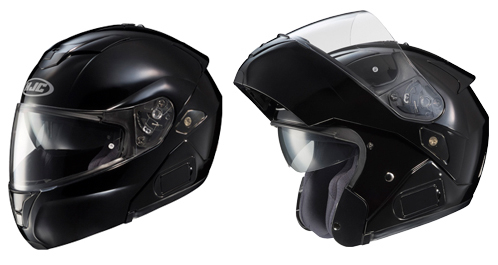In the world of motorcycling, helmets are not just a legal requirement but a crucial safety feature that can save lives. Over the years, helmet technology has evolved, offering riders various options in terms of design, comfort, and safety. Among these innovations, modular helmets have emerged as a popular choice for riders who seek a combination of protection, convenience, and versatility.
Modular helmets, also known as flip-up helmets, offer a unique blend of full-face and open-face designs. These helmets can be easily adjusted to provide more ventilation or full coverage depending on the rider’s needs, making them an excellent option for long-distance touring, commuting, or city riding. In this article, we’ll explore the rise of modular helmets, their benefits, and why they are becoming the go-to choice for many motorcycle riders today.
What Are Modular Helmets?
A modular helmet is a type of full-face helmet that features a hinged chin bar, allowing the rider to flip it up and convert the helmet into an open-face configuration. This versatility makes modular helmets particularly appealing to riders who need flexibility in their gear. Riders can quickly adjust the helmet to suit their environment, whether they’re cruising down the highway or stopping at a traffic light.
While the ability to flip the chin bar is the most notable feature of modular helmets, they still maintain the robust protective features of traditional full-face helmets. With added versatility and advanced safety technologies, modular helmets have become increasingly popular among motorcycle enthusiasts worldwide.

The Benefits of Modular Helmets
1. Versatility and Convenience
One of the primary reasons modular helmets have gained popularity is their versatility. With the ability to switch between a full-face and open-face design, riders can easily adjust the helmet to suit different riding conditions. For example:
- Full-Face Mode: When riding at high speeds, the helmet offers full protection, including the chin and jaw areas, which are more vulnerable in the event of an accident.
- Open-Face Mode: For city commuting, stop-and-go traffic, or when taking a quick break, the flip-up chin bar provides greater ventilation and makes it easier to communicate with others without removing the entire helmet.
This adaptability makes modular helmets ideal for riders who frequently switch between different types of riding. Whether you’re commuting to work or embarking on a long-distance tour, modular helmets give you the best of both worlds.
2. Enhanced Comfort and Ventilation
Modular helmets often feature superior ventilation systems, which are crucial for comfort during long rides. The ability to flip the chin bar open allows for increased airflow, keeping the rider cool in hot weather. Riders can also adjust the level of ventilation based on personal preferences and riding conditions.
Additionally, many modular helmets are designed with removable and washable linings to maintain comfort over long periods of use. This can significantly improve the overall riding experience, especially for riders who spend extended hours on their bikes.
3. Safety Features
Though modular helmets are known for their flexibility, they do not compromise on safety. These helmets are built with the same high safety standards as full-face helmets and feature advanced protection technologies. Key safety features include:
- Reinforced Chin Bar: The chin bar in a modular helmet is often reinforced to ensure it stays securely in place during an accident. Some helmets even feature locking mechanisms to keep the chin bar locked in place during riding, ensuring the helmet maintains its full protective function.
- Multi-Density EPS Liner: Like traditional full-face helmets, modular helmets use Expanded Polystyrene (EPS) foam liners that absorb impact energy. The multi-density construction provides more effective protection against different types of impacts.
- Crash Testing and Certifications: Modular helmets must meet the same safety standards as full-face helmets, including DOT (Department of Transportation), ECE (Economic Commission for Europe), and SNELL certifications. This ensures that they provide reliable protection in case of a crash.
4. Intercom and Communication Features
Modern modular helmets are increasingly equipped with Bluetooth communication systems, allowing riders to communicate with other motorcyclists or take hands-free calls while on the road. This feature is especially useful for group riders who need to stay in touch during long trips. Communication systems also allow riders to listen to GPS directions, music, or podcasts without the need for external devices.
By integrating intercom systems, modular helmets have become even more appealing to motorcyclists who require seamless communication during rides, improving safety and convenience.

The Growing Popularity of Modular Helmets
The rise of modular helmets can be attributed to a variety of factors, including technological advancements, increased comfort, and enhanced convenience. Here are a few reasons why modular helmets are becoming the go-to choice for many riders:
1. Long-Distance Touring and Commuting
Modular helmets are particularly popular among touring riders who cover long distances. The ability to switch between full-face and open-face configurations allows riders to adjust to changing conditions, whether they’re riding on highways or stopping in urban areas. The flexibility to open the chin bar during stops also makes it easier to interact with others or get some fresh air during a long ride.
For commuters, modular helmets offer a significant advantage over traditional full-face helmets. The flip-up feature provides convenience when stopping at traffic lights or running errands, eliminating the need to remove the entire helmet.
2. Increased Comfort in Varying Weather Conditions
Motorcycle riders often deal with a wide range of weather conditions. Modular helmets offer superior comfort by allowing riders to adjust ventilation levels based on temperature. On hot days, opening the chin bar increases airflow and reduces the risk of overheating, while on cold days, the helmet can be fully closed for better insulation.
Riders who live in areas with unpredictable weather or who ride in different climates throughout the year appreciate the adaptability of modular helmets. This ability to customize comfort makes modular helmets a great all-season option.
3. Improved Technology Integration
As motorcycling continues to evolve, helmet manufacturers are incorporating more advanced technologies into modular helmets. Features such as integrated Bluetooth communication systems, noise-canceling microphones, and built-in cameras have become common in modern modular helmets.
These innovations provide additional convenience, allowing riders to stay connected without compromising safety. Bluetooth integration, for example, allows motorcyclists to communicate easily, access navigation systems, or enjoy media while keeping their hands on the handlebars and their focus on the road.
How to Choose the Right Modular Helmet
With so many options on the market, selecting the right modular helmet can be overwhelming. Here are a few factors to consider when choosing a modular helmet:
1. Safety Ratings
Always check for DOT, ECE, and SNELL certifications to ensure the helmet meets safety standards. Modular helmets that carry these certifications offer reliable protection in case of an accident.
2. Fit and Comfort
A helmet that doesn’t fit properly won’t provide the protection it’s designed for. Make sure the helmet is snug but not too tight, and consider trying on a few different models to find the one that offers the best fit for your head shape.
3. Ventilation and Airflow
Consider the ventilation system of the helmet, especially if you plan on using it for long rides. Look for models with adjustable vents and a flip-up chin bar for added airflow.
4. Communication Systems
If you plan on using Bluetooth for communication or music, ensure the helmet is compatible with the system you prefer. Many helmets come with built-in Bluetooth or pre-installed speakers for easy integration.
Conclusion: The Future of Modular Helmets
Modular helmets offer an unparalleled level of versatility, comfort, and safety for motorcyclists. Their ability to easily transition between full-face and open-face configurations makes them ideal for a variety of riding conditions. Whether you’re a commuter, a touring rider, or someone who enjoys off-road adventures, a modular helmet can meet your needs without compromising protection.
As technology continues to advance, modular helmets are likely to become even more innovative, integrating features like advanced Bluetooth communication systems, improved materials for better safety, and enhanced comfort features. With their growing popularity and continuous improvements, modular helmets are undeniably one of the most versatile options in the world of motorcycle safety gear.
Investing in a high-quality modular helmet is not just about comfort; it’s about ensuring your safety on the road while providing the flexibility to ride in any condition. The rise of modular helmets signifies a shift toward more practical and adaptable motorcycle safety equipment — offering riders the best of both worlds.


